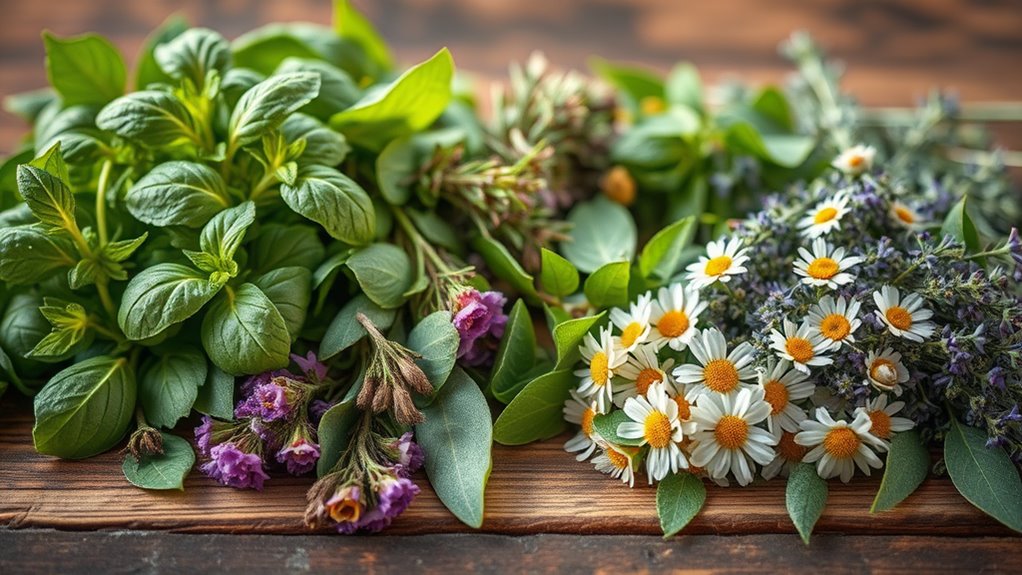These Herbs Have Been Used for Centuries-Here’s Why
Key Takeaways
- Herbal medicine has ancient roots, spanning various civilizations and forming the foundation of contemporary herbalism.
- Time-tested herbs boost immune function, support digestion, and reduce inflammation, contributing to overall health and well-being.
- Many herbs enhance culinary experiences, adding unique flavors to diverse dishes while enriching nutrition.
- Traditional remedies have been utilized in various cultures, linking herbal practices to historical healing methods and community wisdom.
- Scientific research increasingly supports the therapeutic benefits of herbs, showcasing their efficacy and fewer side effects compared to conventional medications.
Ancient Origins of Herbal Medicine
As you explore the rich history of herbal medicine, you’ll discover that its roots stretch back thousands of years, intertwining with the very fabric of ancient cultures. Traditional herbal uses were essential for healing, spirituality, and daily life. From the ancient Egyptians to indigenous tribes, these practices laid the groundwork for contemporary herbalism, showcasing a timeless connection between people and the natural world. Many of these herbs continue to offer medicinal properties that are valued in natural remedies today.
Known Benefits of Time-Tested Herbs
Herbs have long been celebrated for their remarkable healing properties, each one offering a unique array of benefits that can enhance your health and well-being.
You can tap into these time-tested advantages, including:
- Boosting your immune system
- Supporting digestion and gut health
- Reducing inflammation and chronic pain
Incorporating these herbs into your routine can lead to a more vibrant and balanced life. Additionally, many of these herbs have shown transformative effects on mental health and emotional well-being.
Culinary Uses and Flavor Enhancements
Whether you’re a seasoned chef or a home cook, incorporating time-tested herbs into your culinary repertoire can elevate your dishes while adding layers of flavor.
Fresh basil can brighten your pasta, while rosemary enhances roasted meats.
Cilantro adds zest to salsas, and thyme complements hearty soups.
Experimenting with these herbs not only enriches taste but also transforms simple meals into impressive culinary experiences.
Traditional Remedies in Various Cultures
Incorporating herbs into your kitchen not only enriches flavors but also connects you with centuries-old traditions that embraced these plants for their healing properties.
Different cultures have harnessed herbs for various remedies, such as:
- Ginger for digestion in Asian traditions
- Echinacea for immune support in Native American practices
- Thyme for respiratory relief in Mediterranean regions
Explore these herbal wisdoms for better health! Additionally, many of these herbs possess powerful health benefits that can complement their culinary uses.
Scientific Research Supporting Herbal Efficacy
You’ll find that scientific research increasingly supports the use of herbs, highlighting their active compounds and therapeutic benefits.
Clinical trials provide clear evidence of their efficacy, while historical usage offers context to their effectiveness.
Understanding both modern studies and traditional practices can empower you to make informed choices about incorporating herbs into your wellness routine.
Clinical Trials Overview
While many herbs have been employed for centuries to address various health issues, recent clinical trials provide robust scientific evidence that underpins their efficacy.
These studies reveal that:
- Herbal remedies can improve immune function.
- Certain herbs may reduce inflammation and promote healing.
- They often present fewer side effects than conventional medications.
This compelling research demonstrates the potential of herbs as valuable therapeutic options in modern health care.
Active Compounds Explained
Understanding the active compounds in herbs reveals why they’ve stood the test of time in traditional medicine.
These compounds, such as flavonoids, alkaloids, and terpenes, provide impressive healing properties.
Scientific research supports their effectiveness in addressing ailments, enhancing immunity, and promoting overall wellness.
Historical Usage Evidence
Numerous studies highlight the historical usage of herbs, providing substantial scientific backing for their efficacy in healing.
You’ll find that:
-
Ancient civilizations documented herbal remedies for various ailments.
-
Modern research identifies active compounds supporting traditional practices.
-
Clinical trials confirm benefits, bridging past knowledge with contemporary science.
Embracing these findings validates your choice to explore herbal options for health and wellness.
Incorporating Herbs Into Modern Wellness Practices
How can you seamlessly blend ancient herbal wisdom into your modern wellness routine? Start by incorporating herbal teas like chamomile for relaxation or ginger for digestion. Utilize essential oils in your daily regimen for stress relief. Create a personalized herbal supplement plan to boost immunity and energy. Additionally, herbal teas like peppermint can greatly improve digestion and overall well-being.

